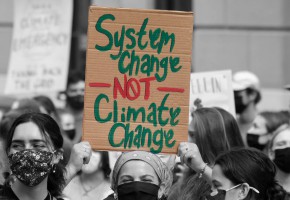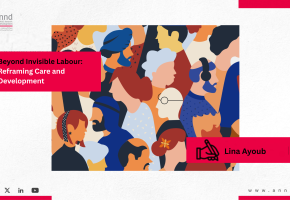
The Water, Food, and Energy Nexus: Jordan’s Climate Priorities, Challenges, and Successes - Mousaab Soboh
The Water, Food, and Energy Nexus: Jordan’s Climate Priorities, Challenges, and Successes - Mousaab Soboh
Jordanian Minister of Water and Irrigation Raed Abu Saud stressed the need to "raise the issues of surface and transboundary water rights and the rights to basin water from water resources that originate outside the state’s borders" among Jordan’s priorities in the negotiations of the upcoming global COP29 climate conference in Azerbaijan.
"No one is talking about transboundary surface water rights. Basin water rights from surface water in downstream countries are not mentioned when talking about climate change. We have clear rights to this water stipulated in international conventions," said Minister Abu Saud in response to a question from the Arab NGO Network for Development (ANND) about Jordan’s environmental priorities and negotiation strategy. He explained that tampering with these rights directly affects the levels of strategic stocks of basins and groundwater. "I think we should put this issue at the top of our agenda; it should be the first item of negotiations at COP29," he added. Minister Abu Saud also stressed the need to talk about global water justice and implement international conventions and provisions on transboundary water rights before talking about climate change, adding that the region's water basins suffer from the fact that "80% of the Arab region's resources come from outside its borders."
Tamer Aqili, Environmental Supervisor at the Azraq Oasis Water Reserve, echoes this opinion. "Climate change is one of the causes of the drying up of more than three-quarters of the Azraq Oasis, but it is not the biggest reason," he told ANND. "The primary reason" is the encroachment on transboundary water arriving from seasonal waterways from Rajel Valley and al-Arab Mountains outside Jordan. These sources constitute around 90 percent of the Azraq Oases basin. This encroachment "leads to an imbalance in the sustainable ecosystem of the basin." Meanwhile, the Azraq basin is the primary water source in Amman (pop. 5 million), with a share between 60 and 80 percent.
Even the Fish Are Thirsty
Aqili explained that excessive extraction and the inability to renew the water to its natural, sustainable level caused the oasis to almost completely dry up in 1993. It threatened to wipe out a rare type of fish, the Sarhani, found exclusively in Azraq. Aqili explained that climate change exacerbated the matter. However, he mentioned that 3 to 4 pairs of fish were found in 1994, dispelling the fear of their extinction. He pointed to the "exceptional efforts of the Royal Society for the Conservation of the Environment" in rescuing the fish and returning them to their natural habitat to enhance biodiversity in the oasis. The water level was preserved through an agreement with the Ministry of Water and Irrigation to pump an estimated 150-250 million cubic meters annually to sustain the balance of its ecosystem. About 25-35% of the oasis remains full of water, with about 340 species of migratory and local birds.
Minister Abu Saud reiterated Jordan's most significant environmental and climate challenge: water scarcity. “Jordan has become the most water-poor country in the world. The per capita share of water is now estimated at only 61 liters, while the global [water] poverty line set by the United Nations is estimated at 500 cubic meters,” he said.
"The strategic groundwater reserve has reached dangerous levels in recent years due to climate change and the violation of transboundary water rights. Our water has become an unavailable element to meet the needs of the water deficit," Minister Abu Saud explained, adding that water scarcity has a "direct and dangerous impact on vital sectors in the country" and that the near future does not bode well. "What can be provided to citizens may be limited to drinking water only, which will kill tourism, agriculture, and industry," he warned.
In an exclusive statement to ANND, Dr. Duraid Mahasneh, former head of the Joint Water Committee and one of the most senior diplomatic negotiators in the transboundary water file in Jordan’s history, clarified the situation. "First, we must reopen the dialogue with our sister country Syria regarding our water rights in the Yarmouk water and the water that crosses our borders," he said. He spoke about the importance of adhering to the agreements between the two countries to regulate transboundary water, most notably the 1987 and Unity Dam agreements. "There is a major violation in the agreements concluded between the two countries," he added. "The Unity Dam was built for this purpose, and its agreement is also being violated. We must resume the dialogue with our brothers in Syria, either through fraternal understanding or working to implement these agreements internationally." He spoke about the lack of trust in the Israeli side in the water rights dossier after water was the first thing the occupation cut off from Gaza. "We must reduce our dependence on the Israeli side in obtaining water,” he stressed. “The national carrier project is one of the important steps in reducing this dependence and strengthening national sovereignty over water," he concluded.
Environmental Challenges and the Water, Food, and Energy Nexus
Jordan is a small country geographically, with a population of about eleven million people and a population density of 5.6 percent. It is one of the countries that contribute least to climate change due to the scarcity of fossil energy resources. However, it is one of the countries most affected by the risks of climate extremism. It suffers from severe water scarcity due to heat waves, drought, fluctuations in rainfall, or sudden rain that leads to devastating floods, cannot be used, and leads to soil recession, deterioration, and landslides. The above has a significant impact on agriculture and food security. It causes severe damage to life, the national economy, and tourism and sharply increases unemployment and poverty rates, which affects social security.
The water deficit in Jordan is estimated at about 500 million cubic meters annually. The country's top priority was highlighted by adopting a comprehensive national strategy to address this issue, its four challenges: geopolitical, administrative, societal, and climatic, and its close connection to agriculture, food, energy, and local industry.
These challenges are a top priority in the royal vision for political and economic modernization. The scarcity of water and energy resources, their strategic security, and their connection to food security within the concept of "the water, energy, and food nexus" are essential elements mentioned in the recent letter of assignment to the new government.
The royal interest in these challenges was demonstrated in the letter of assignment to the government of Jaafar Hassan, who in turn kept ministerial portfolios sensitive to these regional and national challenges, namely the Ministry of Foreign Affairs, the Ministry of Water and Irrigation, the Ministry of Environment, the Ministry of Energy and Natural Resources, the Ministry of Social Development, and the Ministry of Transport.
Regarding administrative solutions, His Majesty King Abdullah II stressed the importance of enhancing water security in Jordan and national water sovereignty through the National Water Carrier Project. In the letter of assignment, he directed the government to begin implementing the project of strategic importance. "The government should start implementing the National Water Carrier project next year, as it is one of the most important public-private partnership projects. This project must be accompanied by efforts to reduce water loss, limit attacks on water lines, and hold accountable those who violate the rights of Jordanians," the letter stated. It also pointed out the need to shift energy towards clean, renewable energy, support the green economy, enhance cooperation with the private sector to support vital ecosystems, and continue the progress in food security, sustainable development, and sustainable agriculture methods.
The National Water Carrier is a project based on treating about 700 million cubic meters of Red Sea water in the Gulf of Aqaba, desalinating and transporting 300 million cubic meters of it to Amman via a vast pipeline network with a length of 414 km and a width of 2-2.5 meters in pipe diameter. The project is expected to play a significant role in bridging a substantial percentage of the water deficit. It also allocates renewable energy fields with a capacity of 131 megawatts, the project’s energy requirement, which drives the energy transition towards clean energy and enhances its security. While the project cost is estimated at $2 billion, Jordan will cover $835 million nationally in cooperation with the private sector.
In an exclusive statement to ANND, Dr. Duraid Mahasneh, Chairman of the Idama Group for Energy, Water, and Environment, spoke about cooperation in the triple nexus. "We must open the way for the private sector to invest in the water sector in cooperation with the state by drilling agricultural wells, desalinating them, and supplying them to the Ministry of Water," he explained, stressing the need to enhance sustainable agricultural practices and shift towards clean energy and its impact on environmental policies. "All our water projects must take into account alternative energy. The Ministry of Water has 35 purification plants, only one operating on alternative energy. We must reduce the Ministry of Water’s reliance on traditional energy towards the shift to clean energy," added Mahasneh.
Speaking about water diplomacy, His Highness Prince El Hassan bin Talal wrote an article for Al-Qabas newspaper entitled "Rabi’ Awwal… Towards a New Humanity." In it, he stressed the need to "engage in all forms of human cooperation that champion collective human interests such as preserving the environment, combating multidimensional poverty, and confronting human deprivation in all its forms and types." He pointed to the several global initiatives he had launched to promote water diplomacy and protect the environment, "such as the Blue Peace Initiative, concerned with water management in the region, and the WEFE Initiative, concerned with water, energy, food, and the environment."
Successes and criticisms
Jordan's national momentum in climate, environment, and sustainable development issues has accelerated over the past three years. The Ministry of Environment started playing a more prominent role and coordinating with relevant ministries in the environmental file, such as water, transportation, agriculture, and energy, to determine and implement specific national strategies. International reports conclude ambitious mitigation, reduction, and adaptation policies could have been the reason for the country's apparent progress.
However, the country's environmental challenges due to climate change, coupled with the security and economic challenges of continuous ecocidal wars in the region, are still heavy. They require activating the concept of climate justice globally in the next stage and addressing the criticisms related to several local and international policies regarding climate justice.
Regarding the national water strategy, the United Nations Water Agency stated in a report issued in the summer of 2024 that Jordan "witnesses the fastest progress among West Asian countries in implementing mechanisms for managing and securing drinking water, improving the quality of the water and sanitation network, and desalination and reuse mechanisms within its declared national strategy." The report attributed this success to "high-level government commitment," the "huge investments in water management infrastructure, and investment plans estimated at eight billion US dollars in cooperation with donor countries." Nevertheless, observers believe these investments do not benefit the vulnerable groups and communities most affected by water scarcity and climate extremism.
On the other hand, Minister Abu Saud, who will complete his ministerial duties within the new government of Jaafar Hassan and set a four-year timetable for completing the National Carrier Project, explained the importance of improving water management policies and addressing network losses. "In 3 months, we were able to recover about 30-40 million cubic meters of network losses estimated at 100 million cubic meters annually," he said. He attached great importance to this matter in the water security administrative solutions.
Widespread criticism had been directed at the previous government regarding the renewable energy sector and the new regulation law without adopting legislation and guidelines detailing its implementation mechanisms over three months. Thirty-year-old energy engineer Ibrahim Al-Omari spoke about the issue. "Huge losses have been incurred by our work because permits to start any project have been suspended pending the legislation of the new law," he explained. "I was forced to terminate the contracts of several young employees; they lost their jobs, and we suffered huge losses." In his criticism of the law, Al-Omari said it "contradicts His Majesty the King's vision and that of the Crown Prince in employing young men and women and promoting their role, and contradicts the vision of economic modernization towards investing in renewable energy and energy transition."
Although the Minister of Energy, who continued to hold the ministerial portfolio in the current government, had responded to the protesters and quickly issued legislation to regulate work under the new law, criticism continues regarding the nature of the decision. Opponents of the decision from about 78 companies see that it "reduces the economic feasibility of the transition towards renewable energy sources, especially for establishments, companies, and small factories," which raises the level of demands for reforms to the decision under the principle of climate and economic justice. In addition to the criticism regarding clean energy, there was a package of decisions to lift tax privileges on electric cars, which led to their high prices, and to reduce taxes in favor of fossil fuel cars, which the previous government took before it resigned.
Jordan has made ambitious efforts to reduce greenhouse gas emissions by 31 percent by 2030, according to the latest updates in the nationally determined strategies 2022-2050, along with efforts to adapt and reduce damage and risks. Thus, it is entitled to receive international support under Article 6 of the Paris Agreement, which obliges donor countries to partially compensate developing and least developed countries for their historical climate responsibilities. Whereas Jordan is committed to contributing to financing projects to reduce and mitigate greenhouse gas emissions by about 5% of the announced goal, 26% remains conditional on international support within the historical responsibilities of developed countries. On the other hand, observers criticize the focus of this support on quick profit and unsustainable economic development that is not directed toward protecting vital systems, in addition to transferring technology to invest in developing countries rather than strengthening the mechanisms for owning and developing it nationally, not to mention the procrastination of donor countries and the evasion of some of them from providing support, even if it is announced within bureaucracy, timetables, and arduous negotiations.
Despite all the climate challenges, Jordan has achieved encouraging success by raising its environmental performance rating by about 7 points, according to the Yale University Global Index. Observers see this as the result of the relentless pursuit of developing and improving climate action policies and the need to move forward at its pace.
Scorching the Green and the Dry
Jordan has humanitarian responsibilities towards the waves of displacement to its territories from neighboring countries over the past decades, the most recent of which was about 1.5 million Syrian refugees. Since about 30% of the country's population is non-Jordanian, there is an urgent need to activate and accelerate international support for the environmental and climate justice track, estimated by the World Bank at about $10 billion. Sustainable development policies must be based on protecting ecosystems and supporting fragile or most affected communities to obtain their share of support and sustainable development.
Jordan is also one of the countries most affected by the surrounding wars and conflicts regarding environmental, economic, and developmental factors. This reality is directly reflected in its environment and raises climate risks. However, there is no talk of compensation from donor countries due to the wars and conflicts they manage or finance. The countries of the Global North are historically and presently responsible for the destruction of vital systems in the region either directly by exploiting its fossil resources or by igniting wars and conflicts and causing destruction to extract them, or indirectly by providing material and political support for the continuation of these ongoing wars. They do not seem to care about anything except achieving quick profits and reinvesting in the limited technology they provide to the countries of the Global South. This raises an urgent need to reconsider thorny files, obligating countries to their responsibilities in seeking to stop the ongoing wars and holding accountable the countries and parties responsible for them, including the companies that manufacture weapons used in the Palestinian territories and southern Lebanon. There is also a need to protect and develop environmental systems, all at the top of the priorities of the negotiating delegations from the countries of the Global South at the upcoming global climate conference in Azerbaijan.
Between the challenges, causes, solutions, aspirations, legislation, and policies, there are processes of climate action and momentum in sustainable development issues that have led to notable recent successes. What may nullify their effect is the stubbornness of the war machine, destruction, and devastation in the region. Jordan is directly and indirectly affected by the consequences.
No one still knows exactly the consequences of the emission of more than 780,000 tons of greenhouse gases, whose impact on the climate is equal to or perhaps greater than carbon dioxide, as a result of the "dumb bombs," missiles, and white phosphorus, which Israel continues to drop on Gaza and southern Lebanon, burning the green, the dry, or what has already been killed by climate change. Meanwhile, international reports indicate comprehensive destruction of vital systems in Gaza, the destruction of infrastructure, the complete lack of safe access to water, its pollution and the spread of chronic diseases such as watery diarrhea and polio. All of these crises will have a direct and dangerous impact on the climate of Jordan, the entire region, and the world in the near future if their consequences have not already begun to appear. It is like a cancer cell in the global ecosystem.
Mousaab Soboh
Recent publications

Argentina and the IMF: A Long History of Financial Dependence and Social Resistance - Tomás Battaglino
Related publications

An Alternative progressive cycle and a revitalized multilateral system - Roberto Bissio

